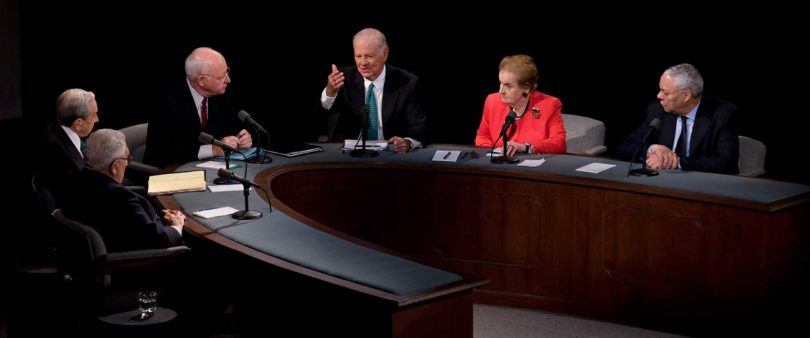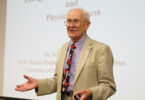As the U.S. prepares for a presidential election in November, five former U.S. secretaries of state convened in Athens at “The Report of the Secretaries of State: Bipartisan Advice to the Next Administration.”
The secretaries, whose influence on foreign policy spans nearly 40 years in both Republican and Democratic administrations, agreed that the next president should be open to taking diplomatic steps with allies and unfriendly countries to further the nation’s standing in the world and help ease global issues affecting the U.S.
The March 27 event was sponsored by the Dean Rusk Center in UGA’s School of Law and the Southern Center for International Studies. It was the 16th such event, drawing a sold-out crowd of more than 2,100.
Colin Powell, who served as secretary of state during President George W. Bush’s first term, said that despite the country’s current low standing in worldwide opinion polls, there is still a “reservoir of respect and affection” toward the U.S. that can be leveraged for better fiscal, military and political options in the future.
“The situation is reversible, and that will begin with the new president,” Powell said. “The new president should close (the U.S. prison facility at) Guantanamo Bay immediately, and by closing that, we are saying to the world that we are going back to the traditional, respected forms of dealing with people who have committed crimes.”
The panel touched on issues ranging from the conflicts in Iraq and Afghanistan to global climate change to the rise of Russia, China and India as major players on the world stage. But in almost every venue, the secretaries agreed that the first steps toward any solution will be repairing or opening lines of communication.
“Since the president’s and secretary of state’s jobs are to protect the security of the United States, (our global standing) hurts us because we’re not able to get the kind of support we need for whatever issues we are facing. I don’t care whether we’re loved or not, but we need to be respected and not just feared for doing the wrong things,” said Madeleine Albright, secretary of state during President Bill Clinton’s second term.
Much of the discussion centered on issues affecting the Middle East. The panel agreed that drawing down the number of U.S. troops in Iraq is inevitable, and advised the next administration to encourage other countries in the region to ease tensions in Afghanistan and aid in resolving the Arab-Israeli conflict.
“We cannot look at (the idea of resolving the Iraq War) as being about Iraq. It’s about the Sunni-Shiite relationship, about the role of radical Islam, about other countries. And it cannot have purely military solutions,” said Henry Kissinger, who served under Presidents Richard Nixon and Gerald Ford.
James Baker III, secretary of state under President George H.W. Bush, added that the next president should engage Iran.
“You can talk to Iran (today) in the same way we talked to Iran about our common interest in a stable Afghanistan, and Iran helped us and cooperated with us,” he said. “We need to do the same thing with respect to [Iran’s interest in a stable] Iraq. A dysfunctional Iraq is not in the interest of Iran. There’s every incentive to help us. They may not do it, but what do you lost by giving it a shot?”
Pointing to the decline in America’s economy, Warren Christopher, secretary of state during President Clinton’s first term, said that the U.S. needs to have financial and domestic strength to be a viable negotiating party abroad.
“I am one of those who thinks that to be strong abroad we have to be strong at home, not just militarily, but financially as well,” he said. “I see the weak American dollar as a metaphor for the weakness of America abroad. One of the things a new president should do is get our economic house in order.”







